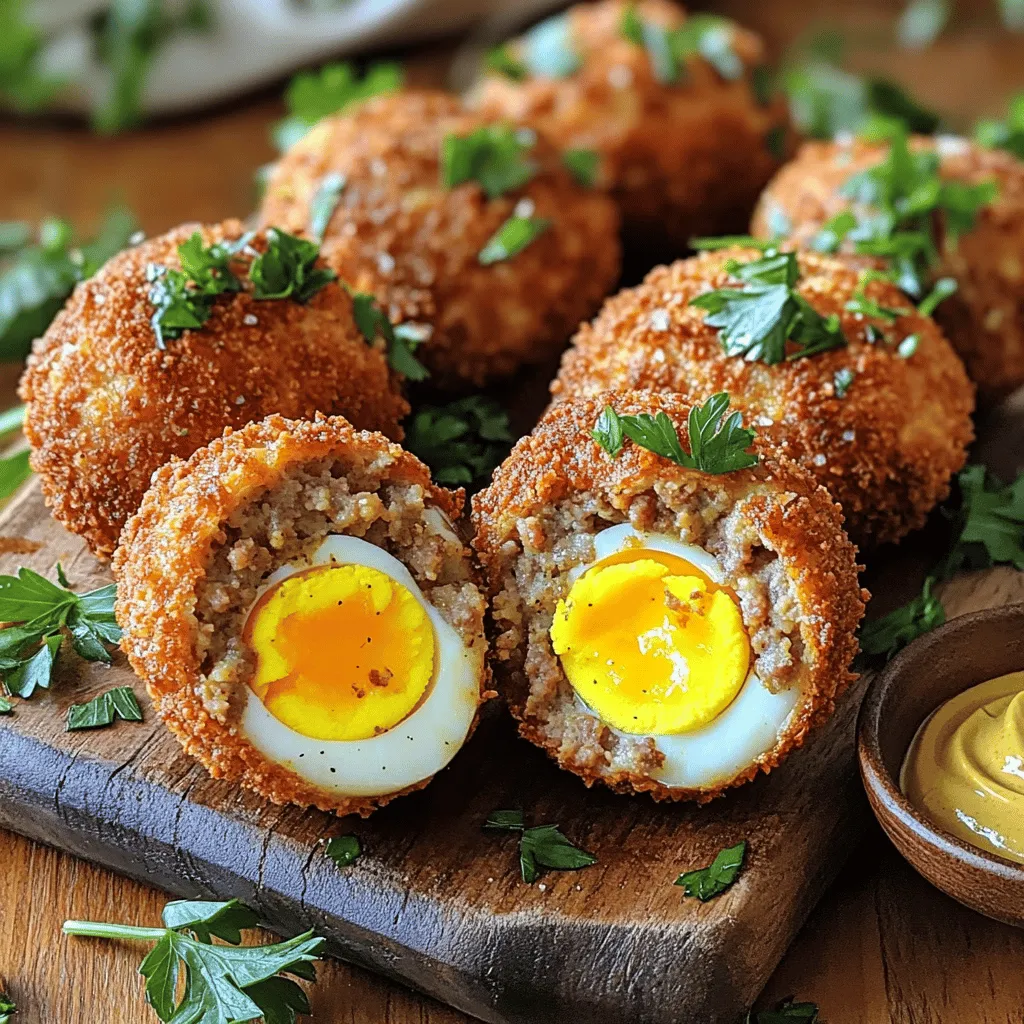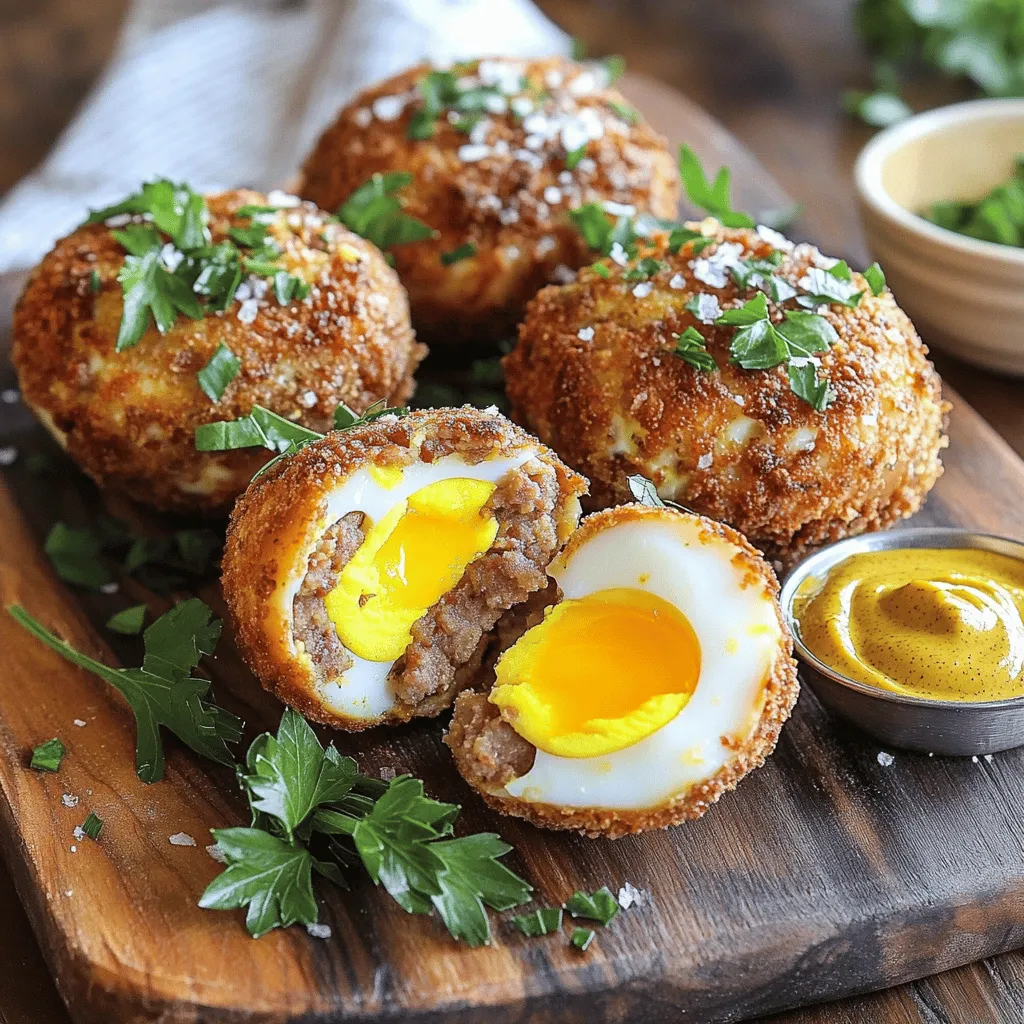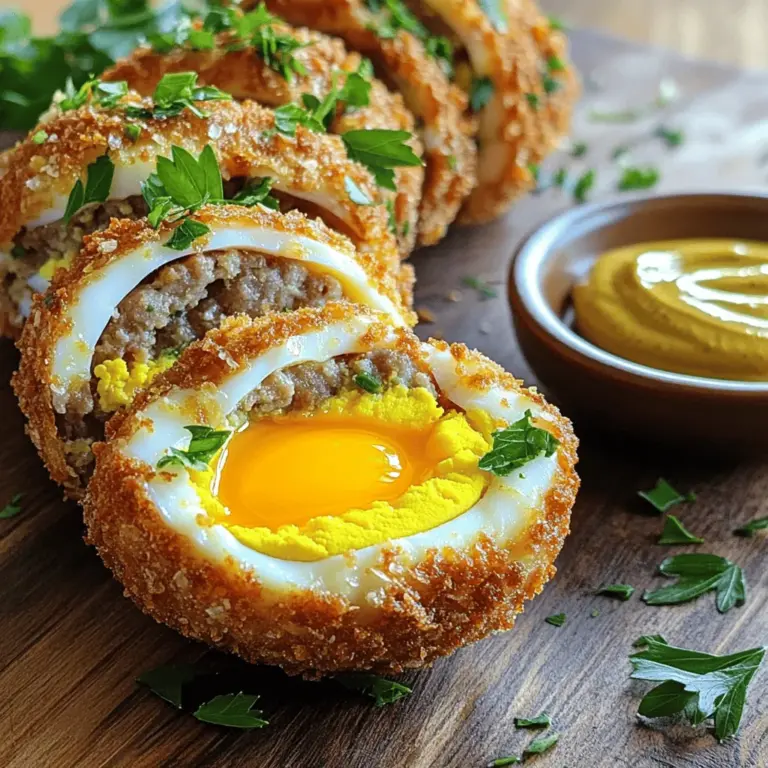Are you ready to explore the world of Scotch Eggs? These savory treats have a rich history and endless variations perfect for any occasion. From their humble beginnings in Britain to the many creative twists we enjoy today, Scotch Eggs are a favorite for brunch, picnics, and parties. Join me as we dive into their fascinating story, discover traditional recipes, and explore fun ways to customize these delicious bites for your next gathering.
What is the history of Scotch Eggs?
Scotch eggs have a rich and tasty history. They likely began in England during the 18th century. Some say they came from a recipe in London. Others believe they trace back to the Scots. The name “Scotch” may refer to the Scots, but it also means “to wrap” in old English.
When and where did Scotch Eggs originate?
The first known recipe for Scotch eggs appeared in a 1809 cookbook. This cookbook was called “The Art of Cookery.” It featured a dish called “eggs in sausage.” Over time, the dish changed. By the mid-19th century, people enjoyed Scotch eggs as a snack or picnic food.
How have Scotch Eggs evolved over time?
Today, Scotch eggs come in many styles. The classic version uses sausage meat and breadcrumbs. However, chefs now use different meats, like lamb or chicken. Some even make vegetarian options using beans or chickpeas. This shows how the dish has grown and changed.
What cultural significance do Scotch Eggs hold in British cuisine?
Scotch eggs have become a beloved snack in British pubs. They often appear on picnic tables and at parties. Their portable nature makes them a favorite for outdoor events. Scotch eggs represent comfort food for many, uniting friends and family over shared meals.
How do you make traditional Scotch Eggs?
To make traditional Scotch eggs, you need some key ingredients. Here’s what you’ll need:
- 4 large eggs
- 1 pound ground sausage meat
- 1 cup breadcrumbs
- 1 teaspoon dried thyme
- 1 teaspoon onion powder
- 1 teaspoon garlic powder
- ½ teaspoon black pepper
- Salt to taste
- 1 tablespoon Dijon mustard
- ½ cup all-purpose flour
- Oil for deep frying
Now, let’s get to the steps for preparing Scotch eggs.
1. Soft Boil the Eggs: Start by boiling water in a pot. Carefully add the eggs and boil for 6-7 minutes. This gives a soft yolk. After boiling, place the eggs in an ice bath to stop the cooking. Once they cool, peel them gently.
2. Prepare the Sausage Mixture: In a bowl, mix the ground sausage with thyme, onion powder, garlic powder, black pepper, salt, and Dijon mustard. Ensure all ingredients combine well.
3. Wrap the Eggs: Divide the sausage mixture into four. Flatten each portion in your hand. Place a peeled egg in the center and wrap it with the sausage, covering it fully. Repeat for all eggs.
4. Coat the Eggs: Set up a breading station. Use three bowls: one for flour, one for beaten eggs, and one for breadcrumbs. Roll each sausage-wrapped egg in flour first, then dip in the beaten eggs, and lastly coat with breadcrumbs.
5. Fry the Scotch Eggs: Heat the oil in a deep pan to 350°F (175°C). Carefully add the Scotch eggs, frying them for 6-8 minutes until golden brown. Use a slotted spoon to remove them and place them on paper towels.
6. Serve & Enjoy: After cooling slightly, slice each Scotch egg in half to show the lovely layers inside.
These Scotch eggs are perfect for any occasion.Enjoy the delicious layers of flavor and texture with every bite!

What are the variations of Scotch Eggs?
Scotch eggs can be so much more than just the classic sausage version. You can mix and match fillings to create new flavors. Some popular fillings include spiced ground lamb, chicken, or even beef. Each meat adds its own twist. For a unique taste, try adding herbs or spices that match your choice of meat.
You can also make vegetarian Scotch eggs. Use mashed chickpeas or lentils as the base. Season them with spices like cumin and coriander. This adds depth and warmth. Instead of sausage, wrap the egg in your veggie mix, then follow the same frying steps.
When it comes to gluten-free options, you can easily swap out breadcrumbs. Use crushed cornflakes or gluten-free breadcrumbs instead. They provide great crunch and flavor. Just ensure your sausage meat is gluten-free too.
To elevate the standard Scotch egg, think outside the box. Add a slice of cheese inside before wrapping. This melts beautifully during frying. You can also experiment with toppings. Try adding a sprinkle of smoked paprika or a drizzle of hot sauce before serving.
These variations make Scotch eggs perfect for any occasion. Whether it’s a picnic, brunch, or a fancy party, there’s a Scotch egg for everyone.
What are the best serving suggestions for Scotch Eggs?
Scotch eggs shine at brunch. You can slice them in half and show off the yolk. Serve them on a platter with fresh greens. Add a dollop of mustard for a tasty kick.
For parties, think of fun finger food. Arrange Scotch eggs on a large board. Pair them with cheese, olives, and some pickled veggies. This mix adds color and flavor.
Side dishes can enhance your Scotch egg meal. A simple green salad works well. You might also serve them with crispy fries or roasted potatoes. These sides balance the rich flavors of the eggs.
Do not forget about sauces! Mustard is a classic choice. You can also try a spicy aioli or tangy salsa. These dips add a new twist to each bite.
Another idea is to serve Scotch eggs as a snack. You can cut them into small pieces for easy sharing. This way, they can please a crowd at any gathering.Get creative with flavors and presentations. Each occasion can be special with your unique touches.

What sauces and dips accompany Scotch Eggs?
Scotch eggs shine with the right sauces. These dips enhance their flavor and make every bite special.
What are the most popular dipping sauces for Scotch Eggs?
The best dipping sauces for Scotch eggs include mustard, ketchup, and aioli. Many love a tangy mustard. It adds a nice kick. You can also try sweet chili sauce for a fun twist. Each dip brings its own flair.
How can you create a homemade mustard sauce to complement Scotch Eggs?
To make a simple mustard sauce, mix 2 tablespoons of Dijon mustard with 1 tablespoon of honey. Stir well until smooth. You can add a splash of vinegar for extra zing. This sauce pairs perfectly with Scotch eggs. It balances the richness of the sausage and egg.
What drinks pair well with Scotch Eggs for a complete meal experience?
When enjoying Scotch eggs, consider pairing them with a light beer or cider. These drinks cut through the richness. If you prefer wine, a crisp white wine works well too. The fresh flavors enhance the meal without overpowering it. Enjoying Scotch eggs with the right drink makes for a lovely dining experience.
How can you adapt Scotch Eggs for different occasions?
Scotch eggs are fun and tasty. You can adapt them for many events. For picnics, make them easy to carry. Wrap each egg in plastic wrap. This keeps them fresh and prevents them from breaking. Use a sturdy container to hold them. Keep the eggs chilled until you are ready to eat.
For tailgating, you want bold flavors. Try using spicy sausage for extra kick. Add some hot sauce to the sausage mix. This will please your friends and family. You can also serve them with a zesty dipping sauce. A chipotle mayo or a tangy mustard works well.
If you plan for outdoor events, focus on seasonal ingredients. In spring, use fresh herbs like basil or dill. In autumn, add pumpkin spice to the sausage mix. This gives a unique twist. You can even make mini Scotch eggs for easier sharing.
For a health-conscious diet, swap regular sausage for turkey or chicken. You can also bake instead of frying. This makes a lighter version that still tastes great. Another option is to use quinoa or lentils in the filling. This makes a vegetarian Scotch egg.
These adaptations make Scotch eggs perfect for any occasion.
Scotch Eggs have a rich history that dates back to their British roots, evolving into various forms over time. We explored how to make traditional Scotch Eggs, their diverse variations, and the best serving suggestions. Whether you are hosting a brunch or a picnic, Scotch Eggs can shine at any gathering. Remember to pair them with complementary sauces and drinks for a complete meal. Enjoy experimenting with different flavors and adaptations to make this classic dish your own! Your culinary adventure with Scotch Eggs is just beginning.



